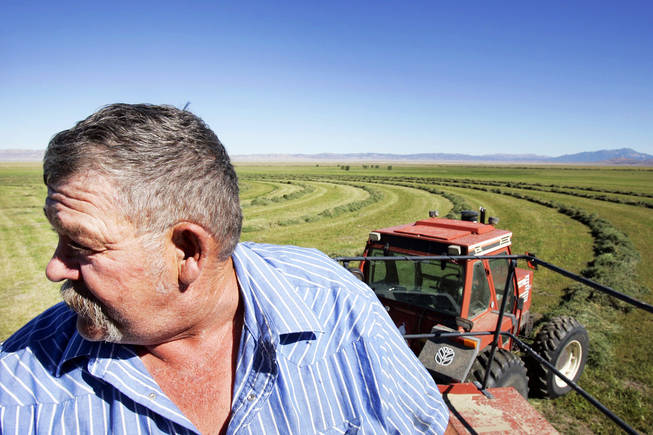
State Assemblyman Pete Goicoechea works on a baler machine on his ranch in the Newark Valley about 30 miles northeast of Eureka, Nev., Wednesday, September 1, 2010.
Sunday, Sept. 5, 2010 | 2:01 a.m.
Pete Goicoechea might be among the most powerful men in Nevada in a few months, holding in his hands the fate of state government, classrooms, welfare and taxes.
Right now though, the leader of the Assembly Republicans is sitting in his Circle Ranch cabin. Outside, horses are neighing, 700 head of cattle are roaming the summer range and his five border collies are slinking under a fence.
Goicoechea (pronounced: Goy-ka-chia) is kicking himself for the “piece of iron” — a tractorlike farm implement called a rake — he broke this morning as he readied alfalfa for winter.
There’s a lot on the ranch demanding his attention right now. But the damn phone keeps ringing.
This time it was John of Ely, and Goicoechea knew the why and how before John said a word.
“You got the robo-call,” Goicoechea says matter of factly. “I’m not proposing a tax on groceries. I’m just saying people should know that they have the ability to raise the tax.”
Then a pause while John of Ely talks.
“We’re going to make cuts. We’re going to cut programs people are depending on.”
It appears Goicoechea’s response has satisfied John of Ely.
Then the assemblyman asks if the two have met. He’ll be at the fair in Winnemucca on Sunday, he says.
The call ends.
“It’s not all bad. I’m talking to a lot of people,” he says.
Goicoechea is a barrel of a man with a good-sized-but-solid gut, tree-trunk arms and a walrus mustache. He’s 60, but moves older, like someone who has spent his life working as a ranch hand, which he has.
He runs his ranch in Newark Valley with his son, J.J., who is also a veterinarian and a contract worker.
This life has bred into him a bluntness, which extends to his political life. Instead of taking the duck-and-cover approach to politics as most have this election cycle, he will say what he thinks.
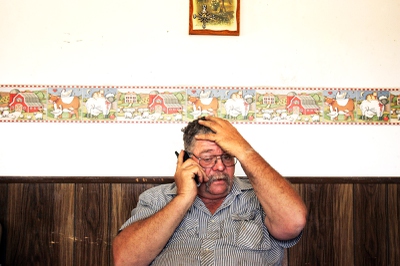
State Assemblyman Pete Goicoechea responds to one of the many calls he got that day from voters in response to an automated calling campaign that has been launched against him while taking a break on his ranch in the Newark Valley about 30 miles northeast of Eureka, Nev., Wednesday, September 1, 2010.
And this is what he thinks: Lawmakers will make cuts. But around May 1, when people get a sense of what those cuts will do, they won’t be acceptable.
“I say it’s like moving cows. Sometimes you get so short-handed, you just can’t move the cows.” So at the end of the day, he says, Nevada government will need more revenue.
He hopes lawmakers won’t have to raise taxes. He’ll break down the budgets to find what can be cut. But that’s what he thinks.
It’s an honesty that is rare in Carson City, or any other place politicians congregate.
And here’s why: The phone rings again. Goicoechea looks down and gives a smile.
“Robo-call,” he predicts.
•••
A couple of weeks ago, Goicoechea went on “Nevada NewsMakers,” an interview show focused on policy and politics.
“I do believe we’re going to have to have some revenue increases,” he said.
Boom! He had said “that which shall not be spoken” — particularly by a Republican, particularly before an election and particularly by one with a divided caucus and an open challenge to his leadership post.
He went on: He wished voters had the option in November to expand the sales tax so it covered groceries, which are exempt.
He likes the idea because it’s equitable. Everyone would pay. There would be no juice game in which lobbyists win exemptions for clients, something happening with a proposal to put a sales tax on services.
“If you’re going to put a sales tax on services, then no exemptions — everyone gets to pay,” Goicoechea said. “But let’s balance it with reducing some of these other very regressive taxes on business.”
Democrats howled because they think taxing groceries is regressive — the poor pay more as a share of their income than the rich.
Some conservatives saw it as giving up the tax fight before the game had begun.
Enter Chuck Muth, conservative political activist. He launched the automated telephone calls — robo-calls — in Goicoechea’s district, telling residents the assemblyman wanted to tax their groceries. If the voters wanted to contact the assemblyman and let him know what they thought, they could press 1 and be connected directly ...
The ranch phone keeps ringing Thursday.
This time it is Wesley of Fallon.
“I’m not proposing a tax,” Goicoechea says, “I’m posing the question. It takes a direct vote of the people. The Legislature wouldn’t have anything to do with it.”
Again, an explanation that seems to satisfy the caller.
Goicoechea says he’s not a Tea Party Republican or a “Muthite.” He doesn’t want to be called a moderate. He calls himself a “conventional Republican.”
“I believe I’m as conservative as anyone in the state: I’m in agriculture,” he said. “But you have to be realistic.”
•••
Goicoechea’s grandfather moved from the Basque region of Spain to Nevada in 1907 to drive wagons.
The grandson is a real Nevada cowboy who takes a giant chew of tobacco from a can of Copenhagen and puts it behind his lips. He never spits. But you hear a swallow every once in awhile.
“I don’t have to” spit, he says, neither bragging nor embarrassed. “I’ve been chewing since I was 10.”
Goicoechea, who was first elected in 2002, lives in Eureka, 240 miles east of Carson City, straight down U.S. 50. The route was dubbed by Life magazine the “Loneliest Road in America” in 1986.
You believe it, even 25 years later. It’s a trip that almost forces travelers into appreciating the shades of browns and green-grays in Nevada’s sagebrush landscape.
Goicoechea’s ranch is 15 miles past this charming town, population 600.
In legislative sessions, during spring, he returns home on Fridays and spends the two nights calving heifers so J.J. can get a couple of nights’ sleep.
During the 2009 Legislature, the Assembly Republican caucus was split. Seven votes were the ideological conservatives, voting no — usually more like hell no — as a bloc. Another seven members tried to be more pragmatic to stay relevant. They voted yes on some taxes (although ultimately, only one, John Carpenter of Elko, voted for the largest tax increase) and tried to negotiate with the Assembly.
They did not negotiate from a position of strength, however. Democrats outnumbered them 2-to-1, a key number that meant they could ignore Republicans for tax increases or veto overrides as long as they held together.
Goicoechea was among the more pragmatic Republicans. He sat for his second session on the Ways and Means Committee, which builds the budget.
“If you haven’t been on Ways and Means, it’s hard to know what the hell you’re looking at,” he said.
The leading candidates for governor, Democrat Rory Reid and Republican Brian Sandoval, have said they would not support a tax increase.
Any legislative proposal to raise taxes must have the support of two thirds of lawmakers. Senate Democrats might pick up two more seats, giving them the two-thirds majority.
In the Assembly, Republicans could pick up as many as five seats.
Under that scenario, Assembly Democrats will need crossover support from Republicans to reach two thirds in that chamber.
Thus, the possibility that Goicoechea, as the likely leader of Assembly Republicans, could soon be among the most powerful men in the state.
Goicoechea said, “We’ll pick up more seats. I have no doubt about that.”
There is no guarantee that Goicoechea will continue as leader of the Assembly Republicans. After Assemblywoman Heidi Gansert of Reno announced she was not seeking re-election, the caucus decided to elect a new leader.
Goicoechea had been Gansert’s No. 2 and the obvious choice. But Assemblyman John Hambrick of Las Vegas also wants the job.
The Goicoechea-Hambrick divide represents a larger one in the caucus, and the Republican Party itself.
Hambrick sides with the ideological conservatives who want steady “no” votes. “I believe the caucus needs to be more conservative in outlook,” Hambrick said.
Goicoechea emphasized that he doesn’t want a tax increase. But he has seen what services mean for the mentally ill in rural Nevada and what the railroad museum can mean to a place like Ely.
Then his phone rings again.
He asks for her name, but she’s just yelling. “You want to hear my side of the story?” Goicoechea says.
“No, I just don’t want any more taxes,” she screams.
“You want to hear my side?” he says again.
“No more Harry Reid, no more Obama and no more taxes.”
Click.
•••
“You got to be broke at least once in your life,” he said.
The Goicoecheas were, in 1970, when his dad had to sell the family’s ranch.
Pete Goicoechea had gone one year to college in Utah, but came back to work on the ranch. The mortgage got to be too much, and they “got up against it. We were starting over.”
Slowly, over the years, through working multiple jobs; through his wife, Gladys, working for Eureka County; through his son going to school and becoming a vet and coming back, he has built up what he has now.
Along the way, he learned about land use and water rights. He served for 16 years on the Eureka County Commission.
In 2002, he ran for the Assembly, after J.J. had moved back to Nevada, and he could spend some time from February to June staying the week in Carson City.
His cowboy demeanor and lack of formal education don’t mean he doesn’t have policy chops.
“He understands everything about water,” Assemblywoman Sheila Leslie, D-Reno, said. “I wouldn’t pursue anything with water legislation without checking with Pete.”
She said he listens, and reads the background. Leslie, a liberal Democrat, said that means people listen when he gives his opinion.
“I disagree with his opinion half the time,” she said. “But I respect it.”
Gansert said, “Whether or not you agree with Pete, you have to respect him for the work he’s done and the knowledge he brings to legislation.”
Gansert, who thinks Goicoechea should be the next minority leader, said, “he is a straight shooter. If you ask him questions, he’ll tell you what he thinks. Sometimes he’s too blunt. But you trust what he says.”
To his critics, his remarks on “Nevada NewsMakers” demonstrated why he shouldn’t be minority leader. (He has a Democratic opponent in November, but is expected to win.)
Muth said, “He doesn’t have any conservative street cred and lacks the political skills. To even suggest what he suggested on a television show shows you’re politically tone deaf.”
In 2003, Goicoechea was a member of the “Mean 15” — Assembly Republicans who blocked an effort to gather a two-thirds majority to approve a major tax increase.
Yet that position was rooted in pragmatism. Goicoechea, at the time, was honest about why he was holding out. He would support a tax increase of $704 million, the amount necessary to preserve existing state services. But the establishment, both Democratic and Republican, wanted a tax increase of $836 million.
Goicoechea’s position angered both sides.
He didn’t go along with the majority and the powers that be — a new courthouse in Ely is still unfunded as retribution for the rural legislator’s opposition. The ultra purists, such as Muth, derided his position as just “wanting a smaller gigantic tax increase.”
Goicoechea acknowledges that the gold mining boom has helped insulate his district, which covers eight counties, from the Great Recession that has battered the rest of the state.
For some, that makes his willingness to discuss a tax on food harder to take.
Still, he says Nevada shouldn’t raise mining taxes.
“In 2001, when gold was $250 an ounce, there weren’t a lot of people offering help to us then,” he said. “It’s boom or bust. I call it chicken and feathers. One day you’re eating chicken, the next you only got feathers.”
•••
Ranching is hard work. But it has its rewards.
“You’ll be up in the morning, and a coyote will be chasing a rat — there’s a herd of antelope. Or springtime, when everything is green and the calves are birthing. You decide it’s worth it,” he said.
Serving in the Legislature can provide a similar experience. There’s plenty of failure. Then there are successes that stand out for a lawmaker, such as bills Goicoechea passed to stabilize water irrigation rates for agricultural users, or to grant a sales tax exemption on farm machinery.
He called these “moments of satisfaction.”
Goicoechea swears that catching flak for saying the state might need to raise taxes doesn’t bother him.
“I’ll probably be more careful in the future,” he said. “But that’s not the way that I’m made. I call a spade a spade.”
Later, he was talking about traveling to Las Vegas — about four hours away — and meeting some folks for a tour of Wynn Las Vegas.
It was hard to imagine him walking through a luxurious Strip casino.
“Las Vegas is different. OK, it’s totally different,” he said as he looked out from his truck at the open land.
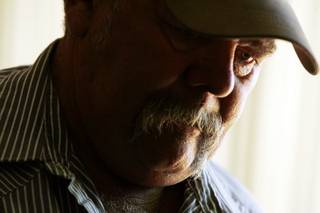
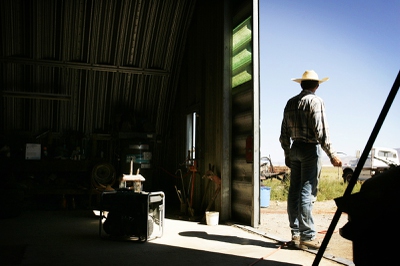
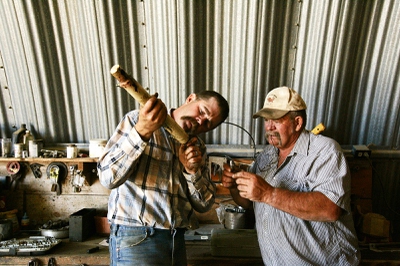
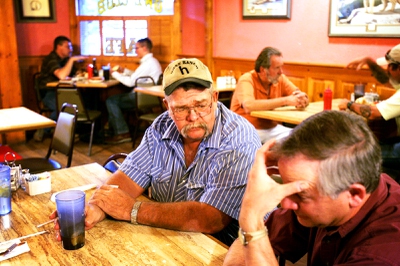
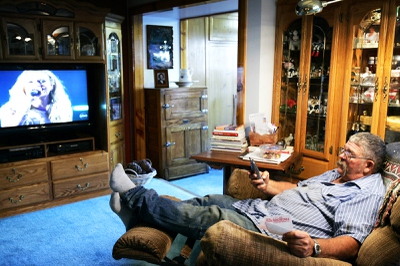
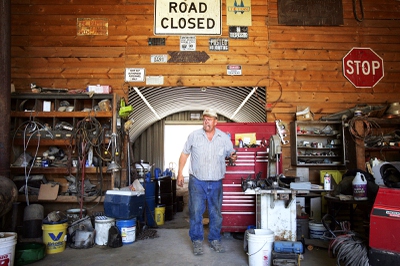

Join the Discussion:
Check this out for a full explanation of our conversion to the LiveFyre commenting system and instructions on how to sign up for an account.
Full comments policy